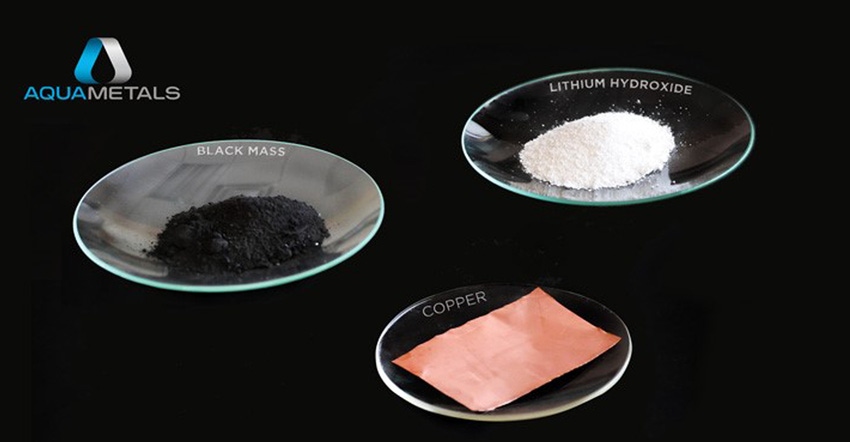The Lithium Aquarefining process extracts Lithium Hydroxide and Copper from black mass composed of mixed spent lithium-ion batteries.

About 705,000 tons of wasted lithium-ion batteries will inundate the world by 2025; adding to that will be another 9 million tons a year until 2040, estimates market research and consulting company Yole Développement.
Today, the only commercially available technology ready to process the pending tsunami is smelting, or pyro-based methods with a heavy footprint. Pyro-based processes use high heat, depending on natural gas to produce it, and may rely on oxygen, which creates polluting nitrogen oxides. Other emission-generating steps entailed in recovery employ potentially harmful chemicals and byproducts that must be disposed.
Some developers are clamoring for a more sustainable solution, with Aqua Metals among them. The McCarran, NV-based startup developed a battery recycling method that, unlike smelting, uses no heat and almost no chemicals (with the small fraction recyclable) and recovers lithium. The process, leveraging electricity, yields high-purity metals, without continuous refining stages and generates no emissions, according to Steve Cotton, president and CEO, Aqua Metals. The first commercial-scale plant leveraging the technology is slated to launch in 2023.
“The electrified world will need recycling to recover metals, especially lithium-ion. We want to be sure the energy transition from fossil fuel to electrified does not move a problem but solves it in terms of greenhouse gas emissions associated with that transition. We need a process to do clean recycling of those minerals,” Cotton says.
Aqua Metals is partnering with LiNiCo, a new cleantech aggregator focused on lithium-ion battery recycling. The companies will bring together LiNiCo’s crushing and separation technology and ability to make a concentrated, pure black mass material (which comes from shredded batteries and contains critical metals) with Aqua Metals’ recycling technology, which will extract critical metals from the black mass.
LiNiCo will license Aqua Metals’ technology at a plant it will buy from Aqua Metals, combining Aqua Metals’ capability to refine materials into a pure commodity with its own capabilities.
The primary goal is to accomplish end-to-end recycling of lithium-ion batteries, says Dave Regan vice president of Commercial Aqua Metals.
“We are currently proving our technology at bench scale and methodically scaling from there. We will continue to increase batch sizes as we progress toward our complete pilot circuit in August/September of 2022,” he says.
From there Aqua Metals will create a larger demonstration unit it plans to place in the LiNiCo facility that will eventually link up with LiNiCo’s technology.
Initially, copper, cobalt, nickel, manganese, and lithium will be processed together on one pilot line. After the method is proved out with separate units the metals will be run together, seamlessly in one system.
The initial project phase should generate 6-10 MT black mass a month, and the subsequent demonstration unit planned for the LiNiCo facility should create 2,500 MT of material a year.
The anticipation is that the purified metals can be sold back to the metal industry or to the lithium-ion battery supply chain.
Aqua Metals’ technology targeting lithium builds on its commercialized process to recover lead from lead acid batteries to make an ultra-pure metal.
“That journey from lab to bench to manufacturing informed our approach with lithium. We are applying the same [hydrometallurgy] principals with lithium ion as with lead,” Cotton says. This will involve dissolving metals in an acid-based, relatively benign electrolyte; then they are plated.
LiNiCo’s first facility will have capacity to crush up to 100,000 metric tons of lithium-ion batteries, as well as consumer electronic devices.
The company will also be able to use the black mass it creates to process 99.99% pure cathode active precursors (cobalt, nickel, manganese, and lithium in salt form that go into the battery).
By combining its technologies with Aqua Metals', the company can introduce a diverse, integrated lithium-ion battery recycling offering, says Corrado DeGasperis, chairman and CEO of Comstock, which has majority ownership of LiNiCo.
“Our two companies have innovative and valuable technical synergies. But our mutual success will be strengthened by establishing an open, effective collaboration between both companies' material science and engineering teams to create a highly synchronized, high-quality, efficient battery metal recycling and manufacturing process.
We hope that Aqua Metals' solutions will enable us to provide the purest and broadest complement of renewable materials for the LiNiCo portfolio and our customers,” DeGasperis says.
Aqua Metals now holds 12% ownership in LiNiCo, its first partner, and is thinking ahead about potential future collaborations with multiple players in the lithium-ion battery space, with a plan to offer different business models, whether joint ventures; licensing the technology; and/or selling equipment.
Cotton anticipates plenty of opportunity.
“The corporate world is driving toward net zero emissions. We think the underlying way we recycle will let industries [particularly battery manufacturing and battery recycling] achieve this,” Cotton says.
“Once the energy transition is complete, electric vehicles can be plugged in a grid that has clean power. And there will be a process in place to recycle minerals needed for a clean, sustainable battery supply.”
Regan adds: “We do not want the recycling piece to be a step backwards. It must be done in a green way.”
About the Author(s)
You May Also Like




